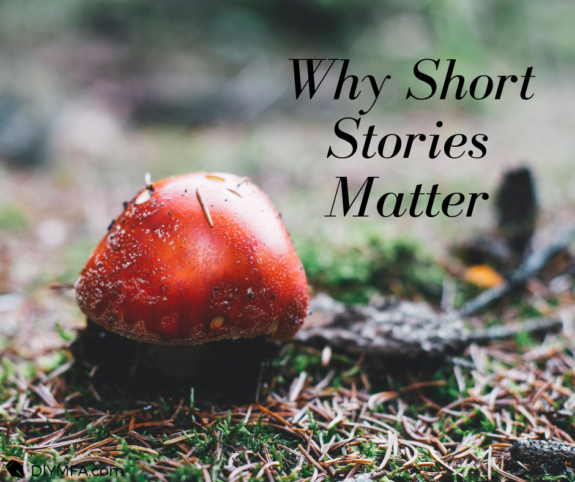Emma Komlos-Hrobsky was one of my very first friends at the MFA program I attended. We served on the staff of the Writing Program literary magazine (LIT) together and I could tell right away from her comments while evaluating submissions that Emma had an eye for awesome fiction. We both graduated in 2010 and Emma has since gone on to work at Tin House magazine, as an editorial assistant. When it came time to line up the roster for the Master Class on Short Fiction, I knew I had to get Emma to guest post. Without further ado, here’s Emma’s take on why short stories matter.
It felt serendipitous when Gabriela invited me to say a little about what we as writers can take from writing short stories because it’s a question I’ve been mulling over for many years now, and because the answer hasn’t always been clear to me. Let me explain.
It is with some sheepishness I confess that I didn’t always know I what reading short stories had to offer me, let alone writing them. The most immediate reason was that until college, I hadn’t met very many. No one had ever introduced me, and the way I imagined them wasn’t particularly flattering.
At the great family reunion of literary forms, where Trade Paperback is the father-in-law manning the barbecue and Free Verse Poetry is the hippie aunt leading noncompetitive team building activities, I saw Short Story as the gangly teenage cousin camped out on the sidelines in an oversized sweatshirt, clearly pained by the thought of seeing and being seen by her family and doing a stellar job pretending to be engrossed in her Ursula LeGuin novel. (That’s right–in this extended metaphor, books read other books!)
I wanted to like her. I maybe even felt a little pity for her. But I couldn’t quite bring myself to saddle over to the picnic table and say hello. I wasn’t sure where she fit in. Instead I stuck to the novels I already knew I loved, ones rich with characters and finely-charted worlds and masterfully drawn plots, all things I presumed would be diminished in the awkward Novel Lite I imagined the short story to be.
It wasn’t until a writing workshop with Steve Almond that I was introduced to the first short story I came to love, and that I now count amongst my best friends in the textual world. The story was “The Barber’s Unhappiness” by George Saunders, and if you haven’t read it, there is nothing else you should be doing right now. “The Barber’s Unhappiness” is everything I’ve ever wanted from a piece of writing. The story is carried by the voice of the wildly, lovably, pathetically delusional barber. Its writing spins and riffs with its language, doing the snarkiest kind of mimicry of the faulty way we think and speak. And above all, it’s hilarious while it stomps all over your heart.
If I ever needed to be convinced that a short story could move me in the way that a novel did, this one did the job and then some—and it did it all in a miraculous 38 pages. (Okay, so not all that short, but a far cry from the 1,463 of Les Miserables I was also meting out to myself in 25 page dosages that semester.) The rest of the short stories we read that fall, and the ones I started searching out on my own, and the ones I’ve loved since, confirm the particular magic of short fiction—its suckerpunch, the way can hold a saturation that a novel would struggle to sustain, the power of that much compressed energy and heat and smarts.
From the other side of an MFA, time served wading through the slush of four literary magazines, and a job that means spending most of my days blissfully marinating in short fiction—not to mention that short story manuscript tucked my proverbial top drawer—it’s strange now to think there was a time I wasn’t ever sold on the short story as a form. Whether or not the short story is the genre that your work is ultimately going to take, it’s absolutely worth reading, and absolutely worth trying on for what it can teach you about craft. In some capacities, they really aren’t so different from the awkward teenage cousin at the picnic, but in ways that turn out to be pretty great:
1) Short stories have short attention spans.
When you’re trying to build a piece of fiction in such a short burst of pages, there’s no room for treading water. You have to know what your story is about, and you have to merciless about writing that and only that with those pages. There’s more room to hide in novels; there may be more ways to obfuscate any authorial flailing in poetry. But just like that sarcastic teenager, short stories will call your bluff here. There will be atmosphere, there’s scene-setting, sure—but with particular focus and a mind on the story’s trajectory forward.
2) Short stories are all about their hard-earned independence.
The best ones are scrappy and rebellious and sure of who they are, even if they can barely reach the gas pedal. They pack a whole slice of a world onto a smallish piece of turf, and there’s an urgency in their need to let you into that world from which it’s impossible to turn. This is that saturation I mentioned before. Short stories want–need–to stand on their own, and that fills the best one’s every ounce, every line, with the essence of who they are.
3) Short stories have a lot of feelings.
And this is the thing about short stories that gets me about them in the end, again and again. Short stories are driven by real people, real feelings. We may only meet them in passing, but in that time, they show us what’s most essential about them, the passions and embarrassments and psychic wounds and fever dreams that drive them stumbling forward. We get to know all their secrets. Then we realize they’re also ours. You don’t have to be as nosy as I am to find this, to find the short story itself, irresistible—you just have to be human.

Emma Komlos-Hrobsky’s writing has appeared or is forthcoming in Hot Metal Bridge, The Splinter Generation, The Story Collider, Verbal Pyrotechnics, and Dreamboat Literary. She received her MFA from the New School and was a finalist for the Glimmer Train Short Story Award for New Writers. She currently serves as an editorial assistant at Tin House.







